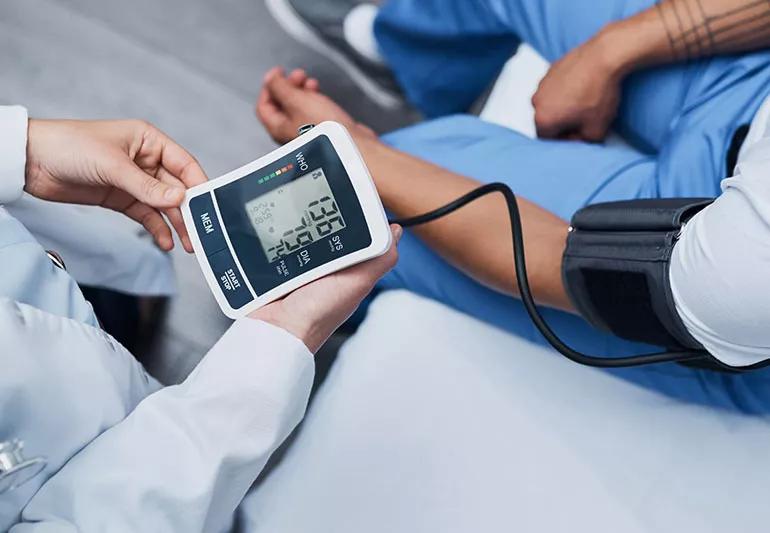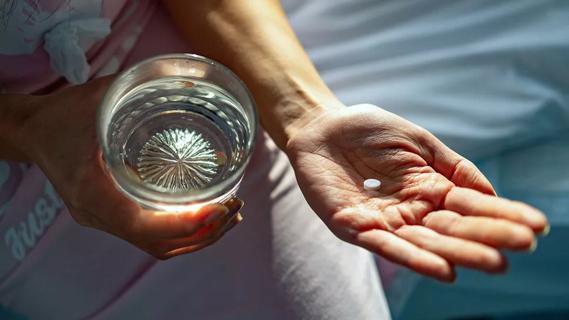Maintaining normal blood pressure should be your goal

Do you know why every visit to your doctor’s office starts with a blood pressure check? It’s because your blood pressure reveals a great deal about your current health and your risk of developing one of many serious medical problems in the future.
Advertisement
Cleveland Clinic is a non-profit academic medical center. Advertising on our site helps support our mission. We do not endorse non-Cleveland Clinic products or services. Policy
Chronically high blood pressure (hypertension) is directly linked to cardiovascular disease. The good news is that lowering blood pressure reduces this risk.
“The reason we treat high blood pressure is to prevent stroke, heart attack, kidney damage and heart failure,” says preventive cardiologist Luke Laffin, MD. “Bringing blood pressure down below 120/80 mmHg decreases the risk of all these serious, potentially deadly problems. That being said, stroke prevention is the most sensitive to blood pressure reduction.”
Blood pressure is the force that blood exerts on the artery walls. It is measured in millimeters of mercury (mmHg) by a gauge attached to a blood pressure cuff.
An optimal blood pressure reading is below 120/80 mmHg. That means that each time the heart contracts, blood is ejected with a force of 120 mmHg. (Think of the force of water shooting through a hose when you turn on the spigot.) When the heart relaxes in order to refill, this force drops to 80 mmHg.
If your blood pressure is chronically higher than 120/80 mmHg, it means the resistance is greater, and your heart has to work harder to push blood through your body. At this point, your doctor may recommend you try certain lifestyle changes to bring it down. These can include losing weight, exercising and cutting down on salt consumption.
Advertisement
If your blood pressure reaches 130/80 mmHg, you are said to have hypertension. Your risk of a cardiovascular event begins to increase exponentially. It may be necessary for you to take one or more medications to bring your pressure down.
Even if you have no symptoms, you should take these medications faithfully.
The terms “high blood pressure” and “hypertension” are used interchangeably, but they are not necessarily the same thing.
“Hypertension is a diagnosis given when someone has multiple blood pressure readings above 130/80 mmHg. It indicates something has caused your blood pressure to rise above normal — stress or exercise, for example.
You can have one episode or an occasional episode of high blood pressure. It doesn’t mean you have hypertension,” says Dr. Laffin.
The most common form of hypertension is called primary hypertension. It is a disease in itself largely caused by advancing age and genetics. By age 80, some 90% of adults have primary hypertension due to arteries narrowed by atherosclerosis. Despite its prevalence, primary hypertension is neither desirable nor inevitable.
“We used to think high blood pressure was essential as we age,” says Dr. Laffin. “Now we know this is not true. High blood pressure in our later years needs to be addressed.”
Hypertension also can be caused by another disease, called secondary hypertension, such as narrowing of the aorta or the arteries leading to the kidneys, or by excess hormone production.
At rest, a normal heart beats 60 to 100 times a minute, depending on your age and level of fitness. This means your heart beats at least 86,400 times a day or 31,536,000 times a year. That’s a lot of work for a muscle the size of your fist. And just like any other muscle that is exercised, the heart will grow bigger when it is forced to strain.
A bigger heart is not better. When the main pumping chamber (left ventricle) reaches a certain size, it can no longer contract with enough force to expel blood efficiently. This is called heart failure with reduced ejection fraction.
High blood pressure can also cause the heart muscle to become stiff, preventing it from refilling properly between beats. This causes heart failure with preserved ejection fraction.
Increased stress on the arteries also causes them to age faster, making them more likely to rupture and cause a hemorrhagic stroke or to develop atherosclerotic plaques, which increase the risk of ischemic stroke as well as heart attack.
Most hypertension-related brain hemorrhages are spontaneous and occur in the small arteries deep in the brain. Hypertension appears to increase the risk of silent stokes in these arteries by as much as 60%.
Advertisement
Unless your blood pressure is sky-high, guidelines suggest first trying non-medical ways to lower it. These include:
If these measures do not lower blood pressure far enough, or if you’ve had a heart attack or stroke or are at high risk for one, anti-hypertension medications will be needed. There are many types, so your doctor may try several different
kinds and doses until the right combination for you is found.
“Hypertension doesn’t often cause symptoms, which is why it is known as the ‘silent killer.’ This gives some people a false sense of security. They don’t understand why they need to make an effort to lower their blood pressure,” says Dr. Laffin. “Fortunately, patients who adopt these measures usually find their blood pressure drops, and with it, their risk of heart attack and stroke.”
This article first appeared in Cleveland Clinic Heart Advisor.
To hear more from Dr. Laffin on this topic, listen to the Health Essentials Podcast episode “Combating High Blood Pressure.” New episodes of the Health Essentials Podcast publish every Wednesday.
Advertisement
Advertisement

Sign up for our Health Essentials emails for expert guidance on nutrition, fitness, sleep, skin care and more.
Learn more about our editorial process.
Advertisement

Foods high in potassium, calcium and vitamins C and E can help lower your blood pressure

Making lifestyle changes can help reduce your blood pressure, but taking cinnamon supplements probably isn’t one of them

Hypertension strains your heart and blood vessels, causing damage that can contribute to heart attacks

Daily stressors can increase BP in the moment, as well as contribute to habits that can feed long-term hypertension

Moderation is best when consuming caffeinated drinks to avoid unhealthy spikes in BP

Medication, exercise and diet changes can all help

While not magic elixirs, some drinks like beet juice and skim milk may help keep numbers down

Don’t believe the rumors about aspirin being a magic way to lower BP

Even small moments of time outdoors can help reduce stress, boost mood and restore a sense of calm

A correct prescription helps your eyes see clearly — but as natural changes occur, you may need stronger or different eyeglasses

Both are medical emergencies, but they are very distinct events with different causes